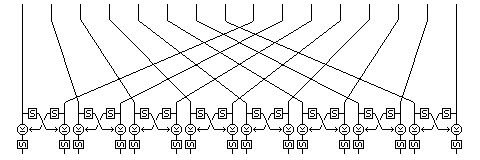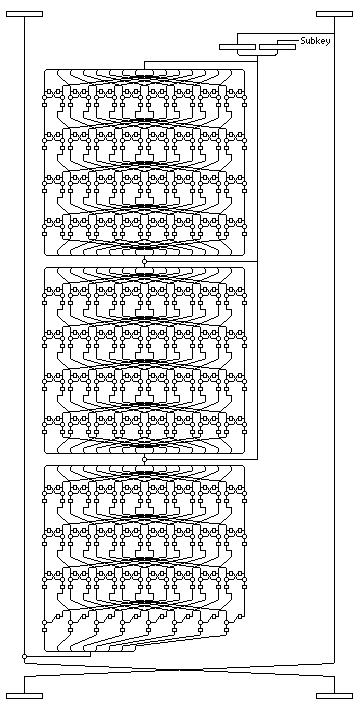
Magenta is a block cipher with a complex and deeply nested design. However, the S-box has a simple structure, and there are also weaknesses in the key schedule. This led to cryptanalytic results being obtained against it shortly after it was disclosed. Although it has been claimed that there are other weaknesses in the design, it still seems to me that the design contains some useful principles.
The S-box used in Magenta is the following:
1 2 4 8 16 32 64 128 101 202 241 135 107 214 201 247 139 115 230 169 55 110 220 221 223 219 211 195 227 163 35 70 140 125 250 145 71 142 121 242 129 103 206 249 151 75 150 73 146 65 130 97 194 225 167 43 86 172 61 122 244 141 127 254 153 87 174 57 114 228 173 63 126 252 157 95 190 25 50 100 200 245 143 123 246 137 119 238 185 23 46 92 184 21 42 84 168 53 106 212 205 255 155 83 166 41 82 164 45 90 180 13 26 52 104 208 197 239 187 19 38 76 152 85 170 49 98 196 237 191 27 54 108 216 213 207 251 147 67 134 105 210 193 231 171 51 102 204 253 159 91 182 9 18 36 72 144 69 138 113 226 161 39 78 156 93 186 17 34 68 136 117 234 177 7 14 28 56 112 224 165 47 94 188 29 58 116 232 181 15 30 60 120 240 133 111 222 217 215 203 243 131 99 198 233 183 11 22 44 88 176 5 10 20 40 80 160 37 74 148 77 154 81 162 33 66 132 109 218 209 199 235 179 3 6 12 24 48 96 192 229 175 59 118 236 189 31 62 124 248 149 79 158 89 178 0
Start with 1, and shift one position left to obtain the next entry: when 1 is shifted out, XOR the contents with 101. This obtains the first 255 entries of the table; use 0 as the last entry.
In the Magenta documentation, f(x) is defined as entry x in this S-box. On that basis, other functions are defined in a step by step manner:
A(x,y) = f(x xor f(y)) [x and y are both bytes]
PE(x,y) = (A(x,y),A(y,x)) [that is, PE(x,y) is A(x,y) catenated with A(y,x)]
pi(x(0), x(1), ... x(15)) = ( PE(x(0),x(8)), PE(x(1),x(9)), PE(x(2),x(10)), ... PE(x(7),x(15)) )
To help keep track of where we are so far, this diagram illustrates how pi(X) operates on a 16-byte bit string:

T(w) = pi(pi(pi(pi(w)))) [where w is a 16-byte vector]
S(x(0),x(1),x(2),...x(15)) = (x(0),x(2),x(4),...x(14),x(1),x(3),x(5),...x(15))
Our last preparatory definition is that of C(n,w), where n is a number, and w a 16-bit vector, as the following:
C(1,w) = T(w)
C(n+1,w) = T(w xor S(C(n,w)))
Note that n is not a piece of the key or of the block being encrypted; it is a parameter giving the depth of recursion used.
Finally, with all these definitions, Magenta is a Feistel cipher.
Each Feistel round is expressed as taking (X(1),X(2)), where each X is half the block, 64 bits in length, and replacing it with (X(2),X(1) xor F(X(2),SK(n))), where n is the round number, and SK(n) the n-th subkey.
The F function equals the first eight bytes of S(C(3,(X(2),SK(n)))).
Thus, a round of Magenta may be pictured as follows:

Since the Magenta f-function consists of a non-invertible function applied to one half of the block with the key appended, the Magenta block cipher is a multi-round example of a Luby-Rackoff construction.
The key schedule is as follows:
It appears that, except for swapping halves, Magenta is reciprocal. The first paper giving a cryptanalysis of Magenta incorrectly gave the key schedule as K1 K2 K1 K1 K2 K1, it appears.
Originally, the F function was going to be the first eight bytes of S(C(7,(X(2),SK(n)))), but the number of rounds inside the f-function was reduced because of a possible weakness. Even so, Magenta is deeply nested with complexity.